Chapter: Psychology: Intelligence
Intelligence Testing
INTELLIGENCE TESTING
In 1904,
the French minister
of public instruction
appointed a committee
with the specific task
of identifying children
who were performing
badly in school
and would benefit from
remedial education. One
member of this
committee, Alfred Binet (1857–1911; Figure 11.1), played a
pivotal role and had an extremely optimistic view of the project. As Binet saw
things, the committee’s goal was both to identify the weaker stu- dents and
then—crucially—to improve the students’ performance through training.
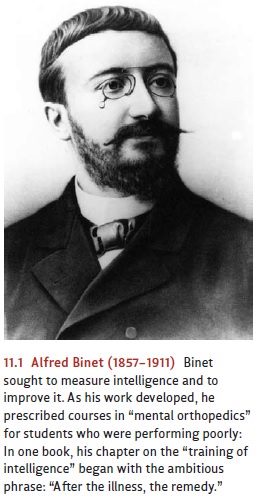
Measuring Intelligence
For their
task, Binet and the
other committee members
needed an objective way to
assess each child’s abilities, and in designing their test, they were guided by
the belief that intelligence is a capacity that matters for many aspects of
cognitive functioning. This view led them to construct a test that included a
broad range of tasks varying in content and difficulty: copying a drawing,
repeating a string of digits, understanding a story, arithmetic reasoning, and
so on. They realized that someone might do well on one or two of these tasks
just by luck or due to some specific experience (perhaps theperson had
encountered that story before), but they were convinced that only a
trulyintelligent person would
do well on
all the tasks
in the test. Therefore, intelligencecould be
measured by a composite score that took all the tasks into account.
Moreover,they believed that the diversity of
the tasks ensured that the test was not measuringsome specialized talent
but was instead a measure of ability in general.Indeed, Binet put a heavy
emphasis on this diversity, and even claimedthat, “It matters very little what
the tests are so long as they are numer-ous”.
In its original form, the
intelligence test was intended only for chil-dren. The test score was computed
as a ratio between the child’s “mentalage” (the level of development reflected
in the test performance) and hischronological age; the ratio was then
multiplied by 100 to get the finalscore (Figure 11.2). This ratio (or quotient) was the source of the test’sname: The test evaluated the
child’s “intelligence quotient,” or IQ.
Other, more
recent forms of the test
no longer calculate
a ratiobetween mental and
chronological age, but they’re still called IQ tests.One commonly
used test for
assessing children is the WechslerIntelligence Scale for Children (WISC),
released in its fourth revisionin 2003 (Wechsler, 2003). Adult intelligence is
often evaluated with the Wechsler Adult Intelligence Scale (WAIS); its fourth
edition was released in 2008. Like Binet’s original test, these modern tests
rely on numerous sub-tests. In the WAIS-IV, for example, there are verbal tests
to assess general knowledge, vocabulary, and comprehension; a
perceptual-reasoning scale includes visual puzzles like the one shown in Figure
11.3. Separate subtests assess working memory and speed of intellectual
processing.
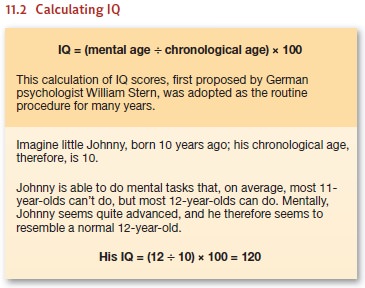
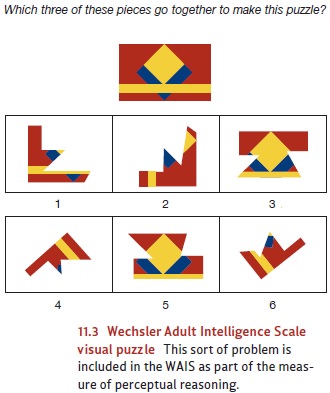
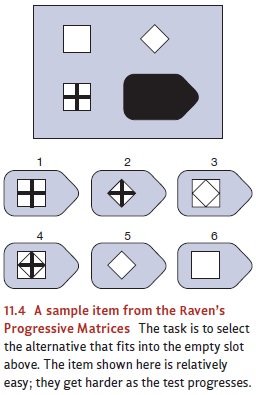
Other intelligence tests have
different formats. For example, the Raven’s Progressive Matrices test (Figure
11.4) contains no subtests and hinges entirely on someone’s ability to analyze
figures and detect patterns. Specifically, this test presents the test taker
with a series of grids (these are the matrices), and she must select an option
that sensibly completes the pattern in each grid. This test is designed to
minimize any influence from verbal skills or back-ground knowledge.
Reliability and Validity
Did Binet (and all who came after
him) succeed in his aim of creating a test that trulymeasures intelligence? To find out, we need to
evaluate the tests’ reliability and validity. As we described there, reliability refers tohow consistent a
measure is in its results and is often evaluated by assessing test-retestreliability. This assessment boils down to a simple
question: If we give the test, wait awhile, and then give it again, do we get
essentially the same outcome?
Intelligence tests
actually have high
test-retest reliability—even if
the two test occasions are
widely separated. For
example, there is
a high correlation
between measurements of someone’s
IQ at, say,
age 6 and
measurements when she’s
18. Likewise, if we know someone’s IQ at age 11, we can predict with
reasonable accuracy what his IQ
will be at age 27
(see, for example,
Deary, 2001a, 2001b;
Deary, Whiteman, Starr, Whalley, & Fox, 2004; Plomin & Spinath,
2004). As it turns out, though, there are some departures from this apparent
stability. For example, a sub- stantial change in someone’s environment can
cause a corresponding change in his IQ score.
Even so, if someone stays in a
relatively stable and healthy environment, IQ tests are quite reliable. What
about validity? This is the crucial evaluation of whether the tests really
meas- ure what we intend them to measure, and one way to approach this issue is
to assess its predictive validity: If the tests truly measure intelligence,
then someone’s score on the test should allow us to predict how well that
person will do in settings that require intelligence. And here, too, the
results are promising. For example, there’s roughly a !.50 correlation between
someone’s IQ and subsequent measures of academic per- formance (e.g.,
grade-point average; e.g., Kuncel, Hezlett, & Ones, 2004; P. Sackett,
Borneman, & Connelly, 2008). This is obviously not a perfect correlation,
because we can easily find lower-IQ students who do well in school, and
higher-IQ students who do poorly. Still, this correlation is strong enough to
indicate that IQ scores do allow us to make predictions about academic
success—as they should, if the scores are valid.
IQ scores are also good predictors
of performance outside the academic
world. In fact, IQ scores are among the strongest predictors of success in the
workplace, whetherwe measure success
subjectively (for example,
via supervisors’ evaluations)
orobjectively (for example, in
productivity or measures
of product quality;
Schmidt &
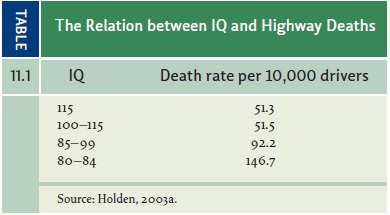
Hunter, 1998, 2004; P. Sackett et
al., 2008). Sensibly, though, IQ matters more for some jobs than for others.
Jobs of low complex-ity require relatively little intelligence; so, not
surprisingly, the cor-relation between IQ and job performance is small
(although still positive) for such jobs. Thus, for example, there’s a
correlation of roughly .20 between IQ and someone’s performance on an assem-bly
line. As jobs become more complex, intelligence matters more, so the
correlation between IQ and performance gets stronger (Gottfredson, 1997b). Thus
we find correlations between .5 and .6 when we look at IQ scores and people’s
success as accountants or shop managers.
Still other results also confirm
the importance of IQ scores and make it clear that, if we measure someone’s IQ
at a relatively early age, we can use that measure to predict many aspects of
her life to come. For example, people with higher IQ scores tend, overall, to
earn more money during their lifetime, to end up in higher-pres-tige careers,
and even to live longer. Likewise, higher-IQ individuals are less likely to die
in automobile accidents (Table 11.1) and less likely to have difficulty
following a doctor’s instructions. (For a glimpse of this broad data pattern,
see Deary & Derr, 2005; Gottfredson, 2004; Kuncel et al., 2004; Lubinski,
2004; C. Murray, 1998.)
We should emphasize that, as with
the correlation between IQ and grades, all of these correlations between IQ and
life outcomes are appreciably lower than !1.00. This reflects the simple
fact that there are exceptions to the pattern we’re describing— and so some
low-IQ people end up in high-prestige jobs, and some high-IQ people end up
unsuccessful in life (with lousy jobs, low salaries, and a short life
expectancy). These exceptions remind us that (of course) intelligence is just
one of the factors influencing life outcomes—and so, inevitably, the
correlation between IQ and life success isn’t perfect. Nonetheless, there’s
still a strong statistical linkage between IQ scores and important life
outcomes, making it clear that IQ tests do measure something interesting and
consequential.
Related Topics